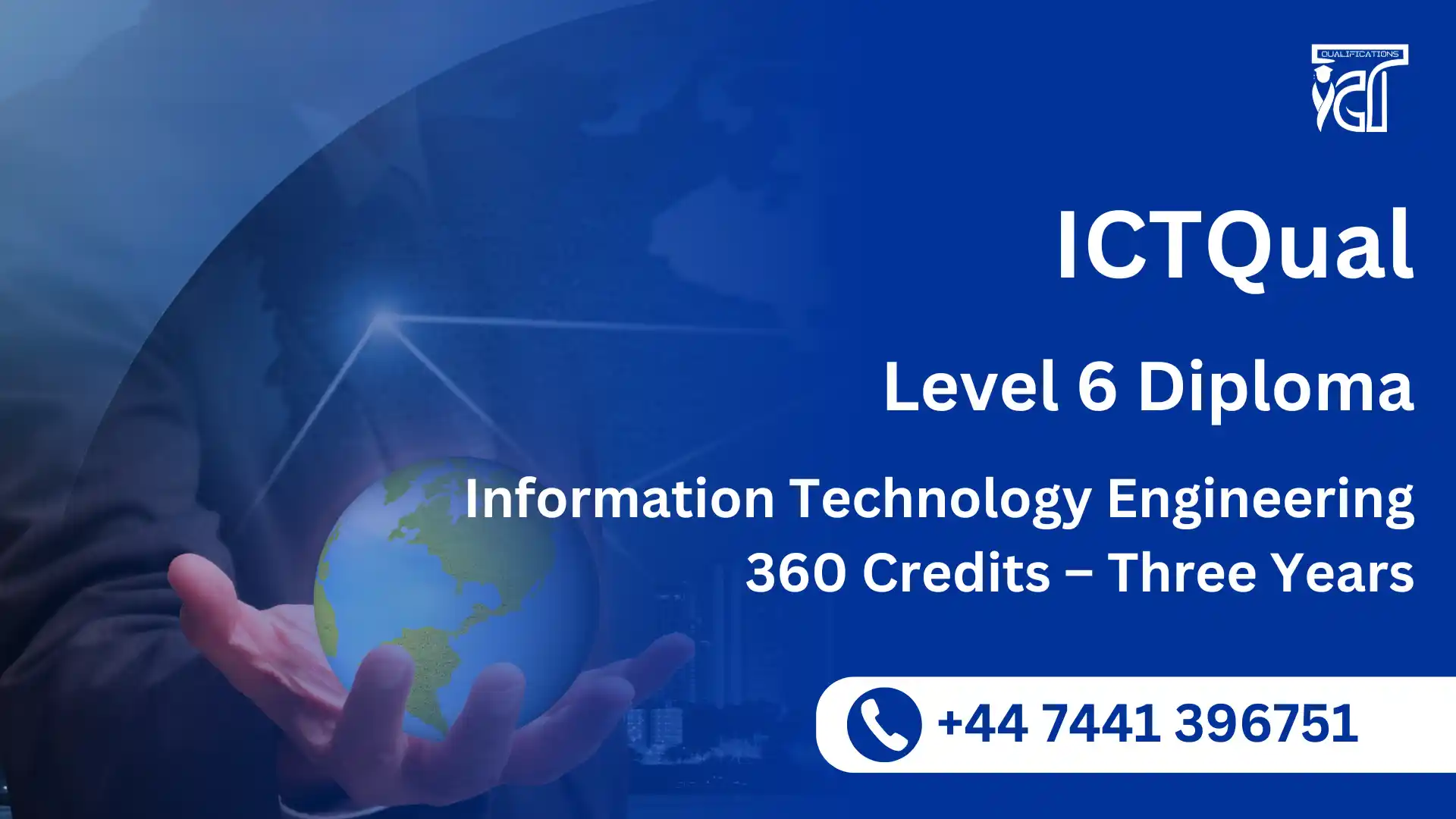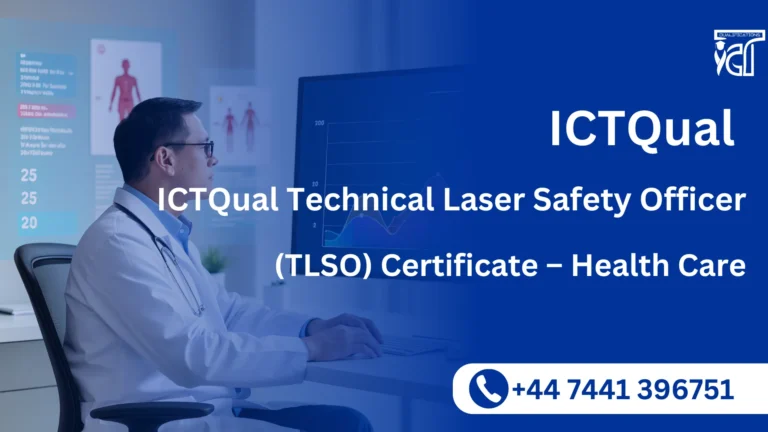The ICTQual Level 6 Diploma in Information Technology Engineering 360 Credits – Three Years is a comprehensive programme designed to equip learners with advanced technical knowledge, practical skills, and industry-relevant expertise in the rapidly evolving IT sector. Whether you are a fresher looking to build a strong foundation in IT engineering or an experienced professional aiming to enhance your career prospects, this diploma provides the tools and competencies needed to succeed in modern technology-driven environments.
Over a three-year period, learners complete a structured 360-credit curriculum that balances theoretical understanding with hands-on application. The programme covers essential areas such as network engineering, software development, cybersecurity, cloud computing, and IT infrastructure management, enabling learners to develop the technical proficiency required for diverse IT roles.
Graduates of this diploma gain critical skills including systems analysis, project management, problem-solving, and technical leadership, preparing them for a wide range of career opportunities in IT organisations, technology consultancies, software development firms, and infrastructure management teams. Learners also develop the ability to implement innovative solutions, manage complex projects, and adapt to emerging technologies in a fast-paced industry.
Key benefits of the programme include mastery of advanced IT engineering concepts, practical experience in real-world projects, and preparation for leadership or specialist roles. Upon completion, learners emerge as highly skilled IT professionals capable of contributing to digital transformation, infrastructure optimisation, and technology innovation on both local and international scales.
This diploma is ideal for ambitious learners passionate about information technology, engineering solutions, and digital innovation, offering a clear pathway to professional recognition, career growth, and long-term success in a globally relevant industry.
ICTQual Level 6 Diploma in Information Technology Engineering 360 Credits – Three Years
This qualification, the ICTQual Level 6 Diploma in Information Technology Engineering 360 Credits – Three Years, consists of 36 mandatory units.
Year 1: Foundation and Core Concepts
- Introduction to Information Technology
- Computer Architecture and Hardware
- Operating Systems Fundamentals
- Networking Fundamentals
- Programming Principles
- Database Design and Management
- Web Technologies and Development
- IT Support and Troubleshooting
- Mathematics for IT
- Introduction to Cybersecurity
- Systems Analysis and Design
- Project Management Fundamentals
Year 2: Specialized IT Engineering
- Advanced Networking and Protocols
- Cloud Computing and Virtualization
- Advanced Programming Techniques
- Advanced Database Systems
- Mobile Application Development
- System Security and Risk Management
- Enterprise IT Infrastructure
- Software Engineering and Development Lifecycle
- IT Management and Governance
- Business Intelligence and Data Analytics
- Human-Computer Interaction
- Ethical and Legal Issues in IT
Year 3: Professional Development and Advanced Implementation
- Advanced Networking Technologies
- Artificial Intelligence and Machine Learning
- Cybersecurity for IT Professionals
- Cloud Infrastructure and Services
- Project Management for IT Projects
- Advanced Software Development Practices
- System Integration and Implementation
- IT Research Methodologies
- Professional Practice and Ethics
- Internship/Industry Placement
- Capstone Project I: System Design and Development
- Capstone Project II: Evaluation and Implementation
Learning Outcomes for the Level 6 Diploma in Information Technology Engineering 360 Credits – Three Years:
Year 1: Foundation and Core Concepts
- Introduction to Information Technology
- Understand the fundamentals of IT and its role in modern society.
- Recognize various components of an information system and their functions.
- Identify and describe common IT hardware and software.
- Computer Architecture and Hardware
- Understand the basic structure of a computer system, including CPU, memory, and storage.
- Analyze how data is processed within a computer system.
- Demonstrate an understanding of computer hardware components and their functions.
- Operating Systems Fundamentals
- Understand the key functions of an operating system.
- Describe the role of operating systems in managing hardware resources.
- Demonstrate basic knowledge of file systems, processes, and user interfaces.
- Networking Fundamentals
- Understand basic networking concepts, including network topologies, protocols, and devices.
- Identify the different types of network technologies and their use cases.
- Learn the fundamentals of TCP/IP and data transmission.
- Programming Principles
- Demonstrate understanding of basic programming concepts such as variables, loops, and functions.
- Write simple programs using a high-level programming language.
- Develop problem-solving skills through coding challenges.
- Database Design and Management
- Understand the principles of database design and normalization.
- Demonstrate the ability to create and manage relational databases.
- Use SQL to query and manipulate database data.
- Web Technologies and Development
- Understand the basics of web development, including HTML, CSS, and JavaScript.
- Design and develop simple websites.
- Learn about web hosting, domains, and website deployment.
- IT Support and Troubleshooting
- Learn basic IT support tasks, including troubleshooting hardware and software issues.
- Understand how to diagnose and fix common computer problems.
- Develop problem-solving and critical thinking skills in IT support scenarios.
- Mathematics for IT
- Understand the mathematical concepts relevant to IT, including logic, algebra, and number systems.
- Apply mathematical principles to solve IT-related problems.
- Demonstrate an understanding of algorithms and computational complexity.
- Introduction to Cybersecurity
- Understand the fundamental concepts of cybersecurity, including threats, vulnerabilities, and risk management.
- Recognize common cybersecurity threats such as malware and phishing.
- Learn about basic security measures like firewalls and encryption.
- Systems Analysis and Design
- Understand the systems development life cycle (SDLC) and the role of systems analysis and design in this process.
- Apply methodologies such as UML and flowcharts to design systems.
- Develop skills for gathering requirements and analyzing business needs.
- Project Management Fundamentals
- Understand the core principles of project management, including planning, scheduling, and resource allocation.
- Learn about different project management methodologies such as Waterfall and Agile.
- Develop basic project management skills for IT projects.
Year 2: Specialized IT Engineering
- Advanced Networking and Protocols
- Understand advanced networking concepts such as routing, switching, and network security.
- Analyze and implement network protocols such as IPv6, DNS, and DHCP.
- Design and troubleshoot complex network configurations.
- Cloud Computing and Virtualization
- Understand the fundamentals of cloud computing, including SaaS, IaaS, and PaaS.
- Learn how virtualization works and how to set up virtual machines.
- Understand cloud security and management strategies.
- Advanced Programming Techniques
- Master advanced programming concepts such as object-oriented programming (OOP), design patterns, and multithreading.
- Develop complex software solutions and applications.
- Solve problems using advanced algorithms and data structures.
- Advanced Database Systems
- Understand advanced topics in databases, such as distributed databases and NoSQL systems.
- Design and manage large-scale databases.
- Use advanced SQL queries for optimization and data analysis.
- Mobile Application Development
- Understand the principles of mobile application development for Android and iOS.
- Design and develop mobile apps using appropriate frameworks and programming languages.
- Implement mobile-specific functionalities such as location services and push notifications.
- System Security and Risk Management
- Understand the concepts of system security, including encryption, authentication, and access control.
- Identify and mitigate security risks in IT systems.
- Develop strategies for managing IT system security in business environments.
- Enterprise IT Infrastructure
- Understand the design and management of enterprise IT infrastructure.
- Learn about networking, servers, and storage solutions in a business environment.
- Design IT solutions that meet the needs of large organizations.
- Software Engineering and Development Lifecycle
- Understand the software development life cycle (SDLC) from planning to maintenance.
- Learn about various software engineering methodologies, such as Agile, Scrum, and Waterfall.
- Develop software projects using appropriate project management tools.
- IT Management and Governance
- Understand the principles of IT governance, including regulatory compliance and strategic alignment with business goals.
- Learn about IT service management (ITSM) frameworks such as ITIL.
- Develop skills for managing IT departments and projects effectively.
- Business Intelligence and Data Analytics
- Understand the concepts of business intelligence (BI) and data analytics.
- Learn how to use tools like Excel, Power BI, or Tableau for data visualization.
- Apply data analysis techniques to support business decision-making.
- Human-Computer Interaction
- Understand the principles of human-computer interaction (HCI) and its importance in user interface design.
- Design user-friendly interfaces with a focus on usability and accessibility.
- Evaluate the effectiveness of user interfaces through usability testing.
- Ethical and Legal Issues in IT
- Understand the ethical considerations in IT, including privacy, intellectual property, and data protection.
- Recognize the legal implications of IT decisions and actions.
- Analyze case studies involving ethical dilemmas in IT.
Year 3: Professional Development and Advanced Implementation
- Advanced Networking Technologies
- Understand cutting-edge networking technologies such as SDN (Software-Defined Networking) and 5G.
- Design and implement complex, scalable networks.
- Apply advanced troubleshooting techniques to resolve network issues.
- Artificial Intelligence and Machine Learning
- Understand the core principles of artificial intelligence (AI) and machine learning (ML).
- Apply AI and ML algorithms to solve real-world problems.
- Develop intelligent systems using popular AI/ML tools and frameworks.
- Cybersecurity for IT Professionals
- Understand advanced cybersecurity techniques for protecting IT systems.
- Implement advanced security protocols and conduct penetration testing.
- Develop strategies to defend against advanced persistent threats (APT) and other sophisticated attacks.
- Cloud Infrastructure and Services
- Understand the architecture of cloud infrastructure and services.
- Manage cloud resources using platforms like AWS, Azure, or Google Cloud.
- Implement cloud-based solutions for businesses.
- Project Management for IT Projects
- Master advanced project management techniques for IT projects, including Agile and Scrum methodologies.
- Manage IT project lifecycles from initiation to closure.
- Use project management tools and techniques to monitor and control IT projects.
- Advanced Software Development Practices
- Master advanced software development practices such as continuous integration/continuous deployment (CI/CD) and test-driven development (TDD).
- Implement best practices in coding, debugging, and version control.
- Work on large-scale software development projects with a focus on maintainability and scalability.
- System Integration and Implementation
- Understand the process of system integration and its importance in large-scale IT projects.
- Develop and implement integration strategies for diverse systems.
- Troubleshoot and resolve integration issues.
- IT Research Methodologies
- Understand various IT research methods, including qualitative and quantitative approaches.
- Develop skills for conducting independent IT research.
- Write research papers and reports on IT topics.
- Professional Practice and Ethics
- Understand professional ethics in the IT industry.
- Develop professional practice skills such as communication, teamwork, and problem-solving.
- Apply ethical standards in the development and management of IT systems.
- Internship/Industry Placement
- Gain practical experience working in an IT environment.
- Apply the knowledge and skills gained during the program to real-world projects.
- Develop professional relationships and build a career network.
- Capstone Project I: System Design and Development
- Design and develop an IT system based on real-world requirements.
- Apply system analysis, design methodologies, and development techniques.
- Demonstrate the ability to manage the complete development lifecycle of a system.
- Capstone Project II: Evaluation and Implementation
- Evaluate and implement the IT system developed in Capstone Project I.
- Conduct testing and quality assurance for system implementation.
- Present the system to stakeholders, demonstrating its functionality and benefits.
The ICTQual Level 6 Diploma in Information Technology Engineering equips learners with a comprehensive blend of technical knowledge, practical skills, and professional competencies required to excel in the IT and technology engineering sector. Beyond theoretical understanding, learners gain hands-on experience, problem-solving abilities, and industry-ready expertise, positioning them for a wide range of roles in IT, software, and digital infrastructure industries. The key benefits of the programme are outlined under five areas:
1. Advanced IT Engineering Knowledge
- In-depth understanding of network engineering, software development, cybersecurity, and cloud computing
- Mastery of IT infrastructure management, systems analysis, and emerging technologies
- Awareness of industry trends and innovative solutions in technology engineering
2. Practical Technical and Project Skills
- Hands-on experience with real-world IT projects, system design, and software implementation
- Training in troubleshooting, technical problem-solving, and infrastructure optimisation
- Competence in using modern IT tools, platforms, and engineering software
3. Career and Industry Opportunities
- Preparation for roles such as IT Engineer, Network Administrator, Systems Analyst, Cybersecurity Specialist, or Cloud Solutions Engineer
- Eligibility for specialist or leadership positions in technology consultancies, software firms, and IT departments
- Enhanced employability in local and international IT and engineering markets
4. Professional Development and Leadership
- Development of critical thinking, problem-solving, and analytical abilities
- Project management and teamwork skills for multidisciplinary IT projects
- Understanding of industry standards, regulatory compliance, and IT governance frameworks
5. Personal Growth and Long-Term Competitiveness
- Confidence in managing complex IT systems and engineering projects
- Recognition as a skilled professional in a highly competitive technology sector
- Encouragement of continuous learning and adaptability to emerging IT trends
The ICTQual Level 6 Diploma in Information Technology Engineering is designed for learners who are ambitious, career-focused, and eager to develop advanced skills in IT engineering. This programme suits both freshers aiming to establish a strong foundation and experienced professionals seeking to formalise or advance their expertise. The ideal learner can be categorised under five key areas:
1. Aspiring IT Engineering Professionals
- Fresh graduates or students seeking a structured pathway into IT engineering
- Learners looking to develop a solid foundation in software development, network management, and IT infrastructure
- Individuals aiming to enter IT organisations, software firms, or digital consultancy projects
2. Experienced Industry Practitioners
- Professionals with prior experience in IT, network administration, or software development seeking formal recognition
- Learners looking to enhance technical knowledge, project management skills, and professional credibility
- Individuals preparing for senior, specialist, or leadership roles in IT engineering projects
3. Career-Oriented and Ambitious Individuals
- Learners motivated to progress into specialist or managerial roles within IT engineering
- Those interested in project management, consultancy, or IT innovation
- Individuals focused on long-term career growth and professional development
4. Analytical and Problem-Solving Thinkers
- Learners with strong critical thinking, analytical, and technical problem-solving skills
- Individuals interested in applying theoretical knowledge to practical IT challenges
- Those who enjoy hands-on projects, system analysis, and technology implementation
5. Globally-Minded and Lifelong Learners
- Individuals seeking skills recognised internationally in IT and engineering
- Learners who value continuous professional development and adaptability to emerging technologies
- Those looking to contribute effectively to local and global digital transformation projects
Upon completing the ICTQual Level 6 Diploma in Information Technology Engineering, learners are equipped to advance their careers, specialise in emerging IT fields, and take on leadership roles in technology-driven industries. The programme provides the knowledge, practical skills, and professional competencies necessary for diverse career pathways. Key areas of future progression include:
1. Specialist IT Engineering Roles
- Advancement to positions such as IT Engineer, Network Engineer, Systems Analyst, or Cybersecurity Specialist
- Leadership in software development, network design, and IT infrastructure projects
- Opportunities to manage specialised technical tasks and implement innovative IT solutions
2. IT Project and Infrastructure Management
- Roles including IT Project Manager, Systems Administrator, or Infrastructure Manager
- Oversight of IT systems, network operations, and cybersecurity protocols
- Management of project timelines, budgets, and team coordination in IT environments
3. Software Development and Consultancy Careers
- Employment in software development companies, IT consultancies, and digital solution providers
- Roles such as Software Engineer, Cloud Solutions Architect, or IT Consultant
- Contribution to the development, deployment, and optimisation of technology solutions
4. Further Academic and Professional Qualifications
- Eligibility for postgraduate studies, professional diplomas, or certifications in IT and technology engineering
- Access to specialised courses in cybersecurity, cloud computing, software architecture, and data analytics
- Opportunities for continuous professional development to stay at the forefront of IT innovations
5. International and Global Opportunities
- Career options with multinational IT firms, technology consultancies, and digital transformation projects
- Opportunities to work on international IT infrastructure, software, and innovation initiatives
- Recognition as a competent professional in global IT engineering and technology markets
As an approved centre of ICTQual AB, we provide learners with two structured pathways to achieve the Level 6 Diploma in Information Technology Engineering:
1. Experienced Professionals Route
- Designed for learners with a minimum of 6 years of verifiable experience in IT, network administration, software development, or related technology roles.
- Learners can leverage their prior professional experience to gain recognition without completing all assignments.
- Ideal for professionals seeking formal qualification to validate expertise and advance their career.
2. Fresh Candidate Route
- Tailored for learners with little or no prior IT or technology experience.
- Fresh candidates are required to complete 36 assignments to demonstrate competency across all course modules.
- This structured pathway ensures a thorough understanding of IT engineering principles, practical skills, and industry standards.
All learners must enrol with our approved ICTQual AB centre to access study materials, complete assignments, and receive professional guidance throughout the three-year, 360-credit programme. These certification routes accommodate both freshers and experienced professionals, ensuring every learner achieves a globally recognised qualification in IT engineering.
Entry Requirements
Entry Requirements
The ICTQual Level 6 Diploma in Information Technology Engineering is designed to ensure learners are adequately prepared for the programme while remaining accessible to both fresh candidates and experienced professionals. The entry requirements are as follows:
1. Minimum Age
- Learners must be 18 years or older at the time of enrolment.
- Mature learners with relevant professional experience are encouraged to apply, particularly through the experienced professional route.
2. Educational Background
- Ideally, learners should hold a Level 5 or equivalent qualification in information technology, computer science, or a related discipline.
- Fresh candidates without prior formal qualifications can join through the structured assignment route, ensuring comprehensive learning from foundational to advanced IT engineering topics.
3. Professional Experience
- For the Experienced Professionals Route, learners must have at least 6 years of verifiable work experience in IT, network administration, software development, or related technology roles.
- Fresh candidates without prior experience will complete 36 assignments to demonstrate competency across all modules.
4. Language Proficiency
- Learners must have a good command of English, both written and spoken, to effectively understand course materials, complete assignments, and communicate in professional contexts.
- IELTS 5.5 or equivalent is recommended for international learners, though exceptions may be considered on a case-by-case basis.
5. Technical and Learning Requirements
- Access to a computer or device with internet connectivity to access study materials, submit assignments, and participate in online learning activities.
- Motivation, discipline, and commitment to complete the three-year, 360-credit programme successfully.
These requirements ensure learners are well-prepared to succeed in the programme, whether entering as fresh candidates or as experienced IT professionals seeking to formalise and enhance their expertise.
Register Now
Qualification Process
Qualification Process for the ICTQual Level 6 Diploma in Information Technology Engineering 360 Credits – Three Years
- Self-Assessment:
Begin by evaluating your eligibility to ensure you meet the qualification requirements, including work experience, knowledge, and language proficiency. - Registration:
Complete your registration by submitting the required documents, including a scanned copy of a valid ID, and paying the registration fee. - Induction:
An assessor will conduct an induction to confirm your eligibility for the course and explain the evidence requirements. If you do not meet the criteria, your registration will be cancelled, and the fee will be refunded. - Assignments & Evidence Submission:
Provide all assignments and the necessary evidence based on the assessment criteria outlined in the course. If you are unsure of the required evidence, consult with the assessor for guidance on the type and nature of evidence needed. - Feedback and Revision:
The assessor will review your submitted evidence and provide feedback. Evidence that meets the criteria will be marked as “Criteria Met,” while any gaps will be identified. You will be asked to revise and resubmit if needed. - Competence Evidence:
Submit final evidence demonstrating that all learning outcomes have been met. This evidence will be marked as “Criteria Met” by the assessor once it is satisfactory. - Internal Quality Assurance (IQA):
The Internal Quality Assurance Verifier (IQA) will review your evidence to ensure consistency, quality, and compliance with standards. - External Verification:
The IQA will submit your portfolio to ICTQUAL AB External Quality Assurance Verifiers (EQA) for final confirmation. The EQA may contact you directly to verify the authenticity of your evidence. - Certification:
Upon successful completion of all checks, ICTQUAL AB will issue your official certificate, confirming that you have attained the ICTQual Level 6 Diploma in Information Technology Engineering 360 Credits – Three Years.







